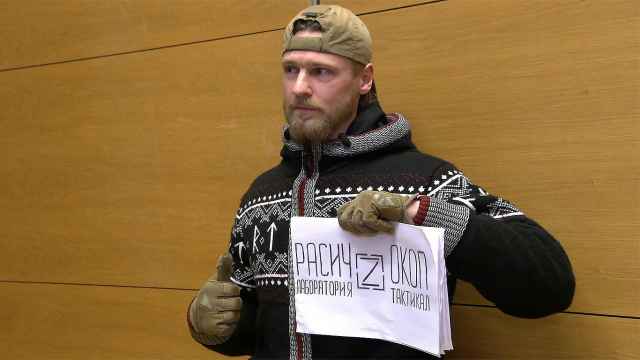AKTAU, Kazakhstan — Unprecedented protests in Kazakhstan's oil-producing Mangistau region spread on Sunday to the regional capital, where hundreds of angry protesters faced reinforced police troops.
Late Saturday, one person was killed and 11 people were wounded in a new clash with police in the local village of Shetpe, bringing the total official death toll in the western region to 12 and the number of wounded to nearly 100.
President Nursultan Nazarbayev declared a 20-day state of emergency on Saturday in the oil city of Zhanaozen, located in the same region, after at least 11 people were killed there in an outbreak of violence on Dec. 16 and 17.
On Sunday morning, about 500 angry protesters gathered near the main square of Aktau, a city of around 160,000. Braving biting frost, they faced a large force of riot police.
One of the protesters, Sarsekesh Bairbekov, said he had been fired by oil company Karazhanbasmunai, or KBM, in May. "I worked there for 20 years. I was a welder and lost an eye," the 58-year-old said.
KBM is jointly owned by London-listed KazMunaiGas Exploration Production and CITIC, China's biggest state investment company.
"We want them to take away the troops," Bairbekov said, referring to the state of emergency imposed in Zhanaozen after the riots.
"They killed local people," he added, wearing maroon-and-blue KBM overalls.
A large group of people supporting Zhanaozen protesters stopped a train carrying more than 300 passengers on Saturday, the Kazakh Prosecutor General's Office said in a statement.
Most of them later left, but some 50 "hooligans" set the diesel locomotive on fire and moved into the nearby village of Shetpe, setting the New Year's tree on fire, smashing shop windows and throwing Molotov cocktails at police, the statement said.
"Taking into account the fact that the hooligans presented a real threat to the life and health of peaceful citizens and policemen, the latter were forced to use weapons," it said.
One of the 12 people brought to a local hospital with gunshot wounds died later, the statement said.
Fired welder Bairbekov, protesting in windswept Aktau, said he had received a monthly wage of 120,000 tenge ($810) before being fired in May. "Now I have no money, no work," he said.
The unprecedented riots began Friday when fired oil workers and sympathetic citizens stormed a stage erected for an Independence Day party and smashed sound equipment in central Zhanaozen, a city of some 90,000 people.
They later set fire to the city hall, the headquarters of a local oil company, a hotel and dozens of other buildings, including trade centers and houses, burned cars and buses and plundered ATMs.
The clashes not only soured pompous nationwide celebrations marking the 20th anniversary of independence from the Soviet Union, they also unnerved a government that has always put stability and economic growth before democratic freedoms.
Nazarbayev, a former steelworker who has overseen rapid market reforms but tolerates little dissent in his hydrocarbon-rich nation of 16.6 million people, declared a state of emergency and a curfew in Zhanaozen until Jan. 5.
Public protests and strikes are banned, while movement around Zhanaozen and access to and from the city is restricted.
State-controlled KazMunaiGas EP, which fired 989 workers in Zhanaozen after staff went on strike for better pay and conditions in May, said 2,500 people were on strike at the height of the dispute. Representatives of the striking workers have put the maximum number at almost 16,000.
A male oil worker, wearing a red-and-blue uniform with the logo of another oil company, Mangistaumunaigas, was among those who turned out in support of sacked oilmen in Aktau, saying: "They have been left without wages since May. We want them to be accepted back to work. All the oil workers and their relatives are supporting them."
A Message from The Moscow Times:
Dear readers,
We are facing unprecedented challenges. Russia's Prosecutor General's Office has designated The Moscow Times as an "undesirable" organization, criminalizing our work and putting our staff at risk of prosecution. This follows our earlier unjust labeling as a "foreign agent."
These actions are direct attempts to silence independent journalism in Russia. The authorities claim our work "discredits the decisions of the Russian leadership." We see things differently: we strive to provide accurate, unbiased reporting on Russia.
We, the journalists of The Moscow Times, refuse to be silenced. But to continue our work, we need your help.
Your support, no matter how small, makes a world of difference. If you can, please support us monthly starting from just $2. It's quick to set up, and every contribution makes a significant impact.
By supporting The Moscow Times, you're defending open, independent journalism in the face of repression. Thank you for standing with us.
Remind me later.





